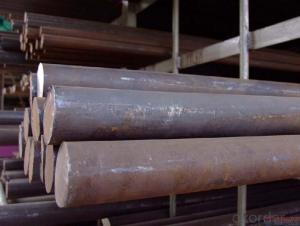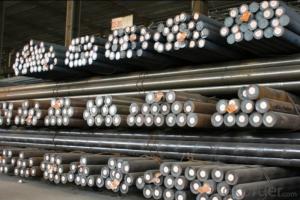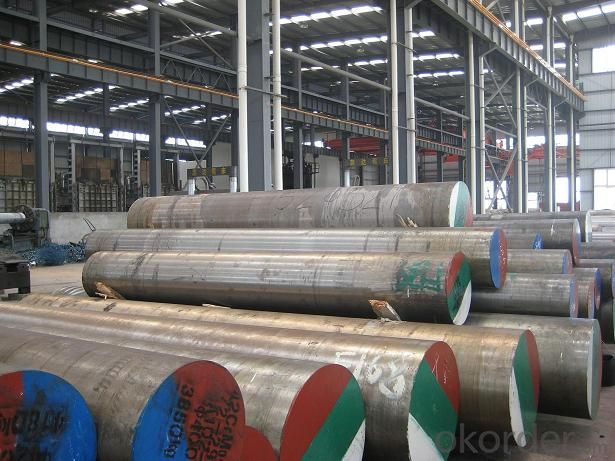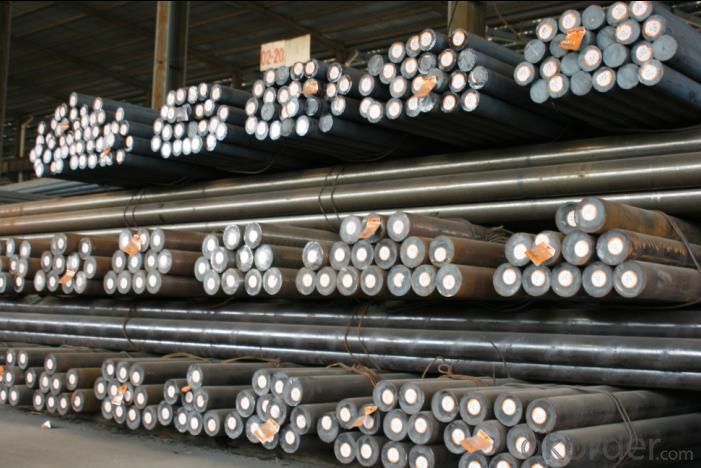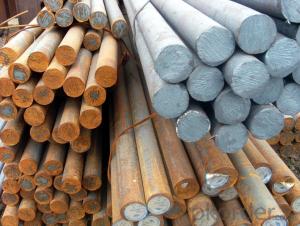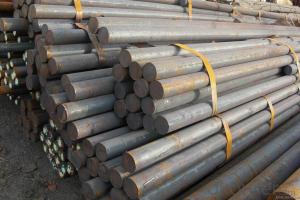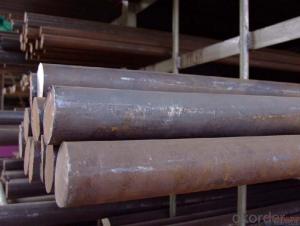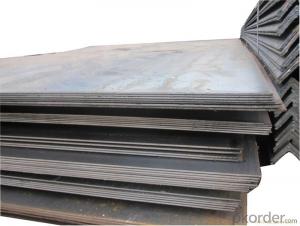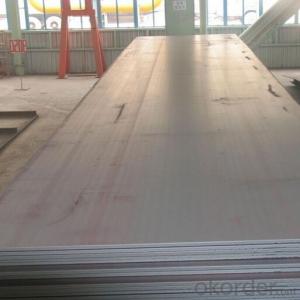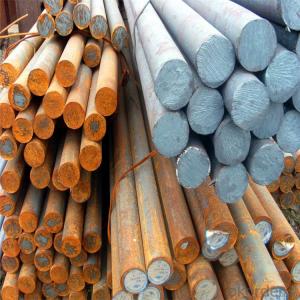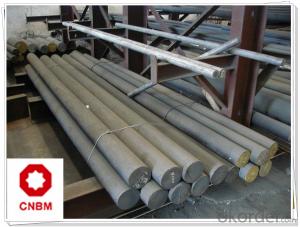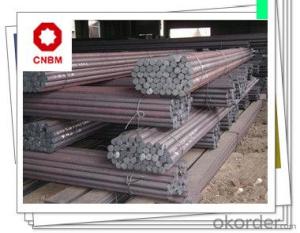Hot Rolled Carbon 25mm Thick Mild Steel Plate S45c
- Loading Port:
- China main port
- Payment Terms:
- TT OR LC
- Min Order Qty:
- 30 m.t.
- Supply Capability:
- 10000 m.t./month
OKorder Service Pledge
OKorder Financial Service
You Might Also Like
Specification
Hot Rolled Carbon 25mm Thick Mild Steel Plate S45c
Product information:
1,Grade: 50#(SAE1050,)
45#(SAE1045,1.1191,S45C)
2,Specification:25/30/35/40/45/50/55/60/65/70/75/80/90/105/115/125MM.cutted any size by customer request
Chemical composition: C=0.42-0.5,Si=0.17-0.37,Mn=0.5-0.8,P≤0.035,S≤0.035,Cr≤0.025,Ni≤0.025
3,Hardness:HBS=140-210
4,Application:Used for making the mould bottom, plastic mould and normal mechinery parts.
5,Payment terms:30%deposit,and balance against T/T or L/C at sight.
| 1.Specifications of ASTM Steel Plate | |||||||||
| Round bar | Diameter(mm) | Length (mm) | |||||||
| 20~800 | 3000~5800 | ||||||||
| Plate | Thickness(mm) | Width (mm) | Length (mm) | ||||||
| Max:800 | 1600~2300 | 3000~5800 | |||||||
| 2.Chemical compositon(%) | |||||||||
| Standard Number | C | Si | Mn | Cr | Ni | Cu | S | P | |
| GB | 45# | 0.42~0.50 | 0.17~0.37 | 0.5~0.8 | ≤0.25 | ≤0.3 | ≤0.25 | ≤0.035 | ≤0.035 |
| AISI | 1045 | 0.43~0.50 | 0.10~0.60 | 0.6~0.9 | ≤ 0.50 | ≤0.40 | |||
| DIN | 1.1191 | 0.42~0.48 | 0.15~0.35 | 0.6~0.9 | ≤0.15 | ≤0.2 | ≤0.3 | ||
| JIS | S45C | 0.42~0.50 | ≤0.40 | 0.5~0.8 | ≤0.40 | ≤ 0.4 | |||
| 3.Delivery condition and Heat treatment | |||||||||
| Forging | Normalization | Hardening | Subcritical annealing | Isothermal annealing | Tempering | ||||
| 1100~850* | 840~880 | 820~860 water | 650~700* | 820~860 600x1h* | 550~660 | ||||
| 4.Characteristic | |||||||||
| Nice machanical porpertys and worse hardenability,so, it is used for machine parts | |||||||||
| 5.Application of ASTM Steel Plate | |||||||||
| 1): Can be used in many fields such as building, automobile, shipbuilding, | |||||||||
| petrochemical, machinery, medicine, food, electric power, energy, space, building | |||||||||
| and decoration, etc. | |||||||||
| 2): Can be made into mould template, mortise pin, column. | |||||||||
| 3): This kind of steel have good mechanical property, is widely used in structural parts | |||||||||
| which may support stress alternation, especially made into some connecting | |||||||||
| rods, bolts, wheel gear... | |||||||||
| 4): This kind of steel is the most common blanks and materials of shaft part. | |||||||||
Product show
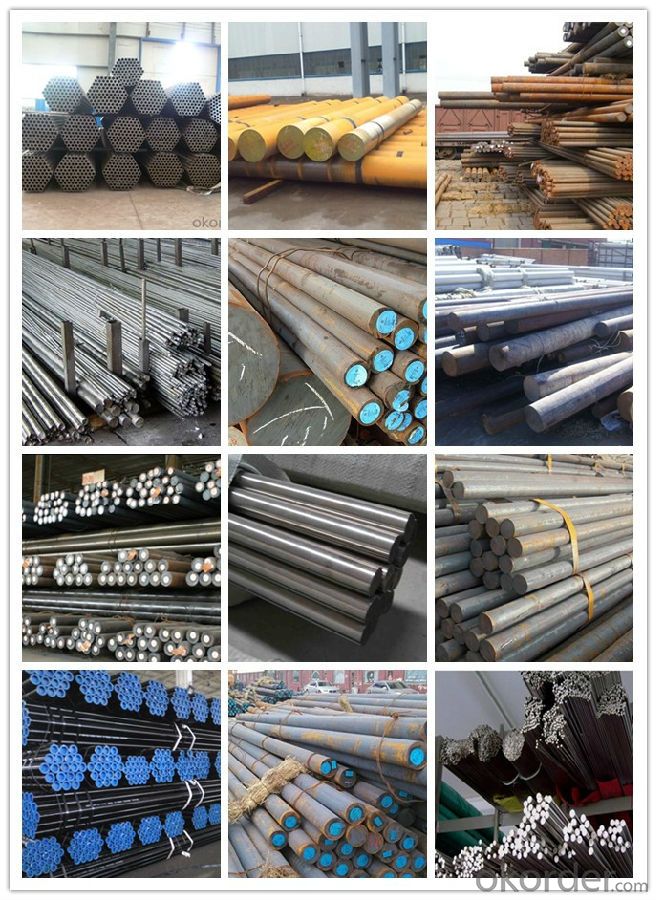
Workshop show
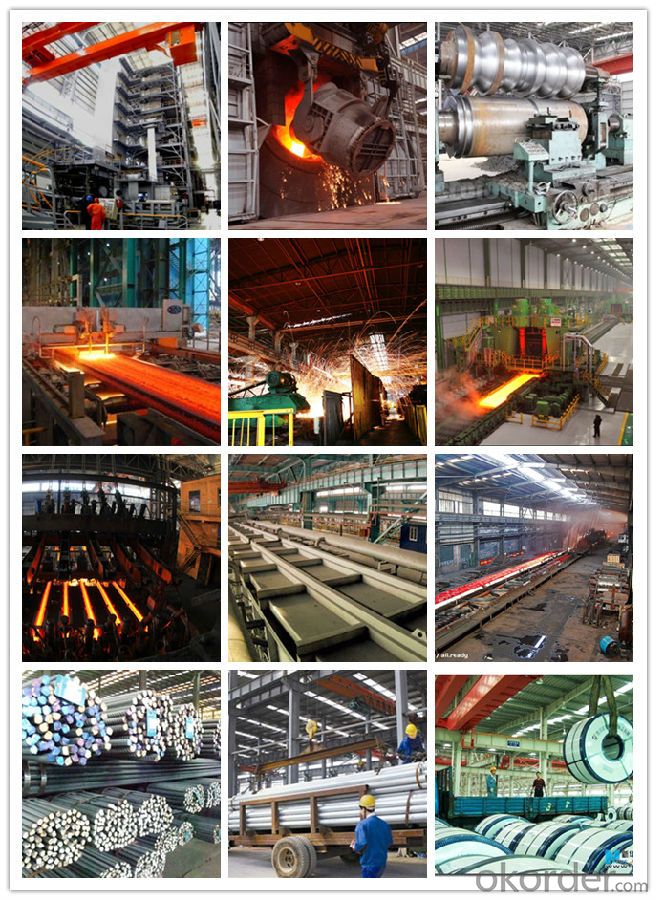
Our service:
-High manufacturing accuracy
-High strength
-Small inertia resistance
-Strong heat dissipation ability
-Good visual effect
-Reasonable price
Chose happens because of quality, then price, We can give you both.Additionally, we can also offer professional products inquiry, products knowledge train(for agents), smooth goods delivery, exellent customer solution proposals.Our service formula: good quality+good price+good service=customer's trust
SGS test is available, customer inspection before shipping is welcome, third party inspection is no problem.
If you need the sample, please feel free to let me know. Any question, we will contact you ASAP!
- Q: How is special steel used in the aerospace industry?
- Special steel is used in the aerospace industry for various applications due to its exceptional strength, durability, and resistance to extreme temperatures. It is commonly utilized in the manufacturing of aircraft structures, engine components, landing gear, and fasteners. The high strength-to-weight ratio of special steel enables the construction of lightweight yet robust parts, contributing to improved fuel efficiency and aircraft performance. Additionally, its ability to withstand harsh environmental conditions and maintain structural integrity makes it indispensable for ensuring the safety and reliability of aerospace systems.
- Q: What are the different heat treatment processes used for special steel?
- There are several heat treatment processes used for special steel, including annealing, normalizing, quenching, tempering, and case hardening. Annealing involves heating the steel to a specific temperature and then slowly cooling it to soften it and improve its machinability. Normalizing is similar to annealing but involves cooling the steel in air instead of slowly. Quenching involves rapidly cooling the steel to increase its hardness, while tempering involves reheating the quenched steel to a lower temperature to reduce brittleness and improve toughness. Case hardening is a process where the outer layer of the steel is hardened while maintaining a softer core, enhancing wear resistance.
- Q: What are the main applications of special steel in the agricultural sector?
- Special steel has various applications in the agricultural sector, primarily in the manufacturing of machinery and equipment. It is used to develop durable and robust components such as plows, tillers, cultivators, harvesters, and irrigation systems. Special steel's high strength and resistance to corrosion make it suitable for withstanding the demanding conditions encountered in agricultural operations, ensuring efficient and reliable performance of machinery in the field.
- Q: What are the different surface protection methods used for special steel?
- There are several surface protection methods used for special steel to enhance its durability and resistance to various forms of damage. One commonly used method is galvanizing, where a layer of zinc is applied to the surface of the steel. This helps to protect the steel from corrosion and rusting, increasing its lifespan and maintaining its appearance. Galvanizing can be done through hot-dip galvanizing or electroplating, depending on the specific requirements of the steel. Another method is powder coating, which involves applying a dry powder to the steel surface and then curing it in high temperatures. This creates a protective layer that is resistant to chipping, scratching, and fading. Powder coating is often used for aesthetic purposes as it provides a wide range of color options and can improve the steel's appearance. Additionally, special steel can be protected using various types of paints and coatings. These coatings can be applied through spray or brush, and they provide a barrier against corrosion, chemicals, and UV radiation. Epoxy, polyurethane, and acrylic coatings are commonly used for this purpose, depending on the specific needs and environment the steel will be exposed to. Furthermore, stainless steel is inherently resistant to corrosion due to its composition, but it can be further protected by passivation. Passivation is a chemical treatment that removes iron particles from the surface, preventing corrosion and enhancing the steel's resistance to staining and pitting. Lastly, special steel can also be protected by applying a layer of ceramic or enamel coating. These coatings provide a high level of resistance to heat, chemicals, and physical abrasion. They can be applied through spraying or dipping and are often used in environments where the steel will be exposed to extreme conditions or aggressive substances. In conclusion, the different surface protection methods used for special steel include galvanizing, powder coating, painting, passivation, and ceramic/enamel coating. These methods aim to enhance the steel's durability, resistance to corrosion, and overall lifespan, ensuring that it can withstand various environmental factors and maintain its structural integrity.
- Q: What are the requirements for special steel used in oil and gas equipment manufacturing?
- The requirements for special steel used in oil and gas equipment manufacturing are quite stringent due to the demanding operating conditions and harsh environments that these materials will be exposed to. Some of the key requirements include: 1. Corrosion Resistance: Special steel used in oil and gas equipment must have excellent resistance to corrosion, especially in the presence of various corrosive fluids such as oil, gas, and saltwater. This helps to prevent degradation and premature failure of the equipment. 2. High Strength: The steel must possess high strength and toughness to withstand the extreme pressures, temperatures, and mechanical stresses encountered in oil and gas operations. This ensures that the equipment can perform reliably under demanding conditions. 3. Heat Resistance: Oil and gas equipment often operates at elevated temperatures, especially in downstream processes such as refining and petrochemical applications. Special steel used in these applications must be able to maintain its mechanical properties and structural integrity even at high temperatures. 4. Weldability: Welding is a common joining technique used in the fabrication of oil and gas equipment. The special steel should have good weldability, allowing for efficient and reliable welding processes without compromising the overall strength and integrity of the equipment. 5. Fatigue Resistance: Oil and gas equipment is subjected to cyclic loading, which can lead to fatigue failure if the material is not properly designed to withstand these repetitive stresses. Special steel must possess good fatigue resistance properties to ensure long-term durability. 6. Low Temperature Properties: In certain applications, such as offshore drilling or arctic environments, the equipment may be exposed to extremely low temperatures. The special steel should exhibit excellent toughness and ductility at low temperatures to prevent brittle fracture. 7. Chemical Composition Control: The chemical composition of the special steel must be tightly controlled to ensure consistent and predictable material properties. This involves strict control over the levels of various alloying elements, impurities, and trace elements to meet the specific requirements of the oil and gas industry. Meeting these requirements is crucial for the safe and reliable operation of oil and gas equipment. Special steel manufacturers work closely with industry standards and specifications to develop and provide materials that meet these demanding requirements, ensuring the integrity and performance of the equipment in the oil and gas sector.
- Q: How does special steel perform in high-temperature oxidation?
- Special steel is specifically designed to have excellent performance in high-temperature oxidation. It has the ability to resist oxidation and maintain its mechanical properties even at elevated temperatures, making it highly reliable and durable in such conditions.
- Q: How does special steel contribute to reducing product failures in high-stress applications?
- Special steel contributes to reducing product failures in high-stress applications by offering enhanced strength, durability, and resistance to corrosion and wear. The unique properties of special steel allow it to withstand extreme conditions, such as high temperatures and pressures, without deformation or failure. This ensures that the products made using special steel perform reliably and have a longer service life, minimizing the risk of failures and resulting in improved safety and cost-effectiveness in high-stress applications.
- Q: How is free-cutting steel used in the manufacturing of screws and bolts?
- Free-cutting steel is used in the manufacturing of screws and bolts because of its excellent machinability. It contains additives such as sulfur, lead, or bismuth that improve its ability to be easily and efficiently shaped into the desired form. This type of steel enables manufacturers to produce screws and bolts with intricate threading and precise dimensions, resulting in high-quality and reliable fasteners.
- Q: What are the different heat treatment defects in special steel?
- Some common heat treatment defects in special steel include decarburization, quench cracking, distortion, and grain growth. Decarburization occurs when the surface of the steel loses carbon during the heating process, leading to a reduction in hardness and strength. Quench cracking refers to the formation of cracks due to rapid cooling after the steel has been heated. Distortion can occur when uneven heating or cooling causes changes in shape or dimensions of the steel. Finally, grain growth refers to the enlargement of grain size, which can negatively impact the mechanical properties of the steel.
- Q: What are the properties of duplex stainless steel?
- Duplex stainless steel possesses a combination of excellent mechanical properties, including high strength and corrosion resistance. It offers good toughness and ductility, making it suitable for a wide range of applications. Moreover, duplex stainless steel exhibits a higher resistance to stress corrosion cracking and pitting corrosion compared to other types of stainless steel. Additionally, it has a good weldability, enabling it to be easily fabricated and used in various industries such as oil and gas, chemical processing, and marine environments.
Send your message to us
Hot Rolled Carbon 25mm Thick Mild Steel Plate S45c
- Loading Port:
- China main port
- Payment Terms:
- TT OR LC
- Min Order Qty:
- 30 m.t.
- Supply Capability:
- 10000 m.t./month
OKorder Service Pledge
OKorder Financial Service
Similar products
Hot products
Hot Searches
Related keywords

